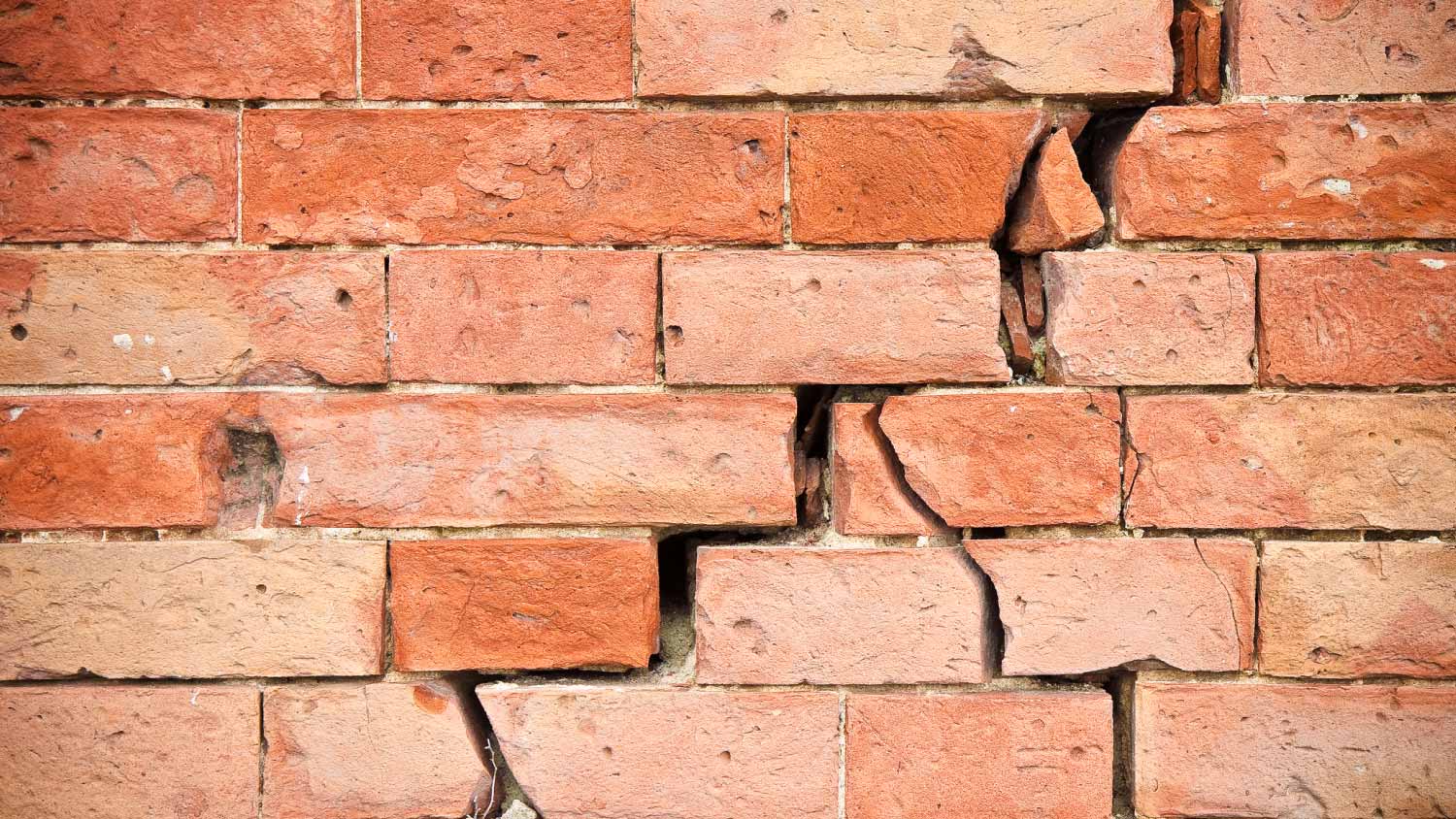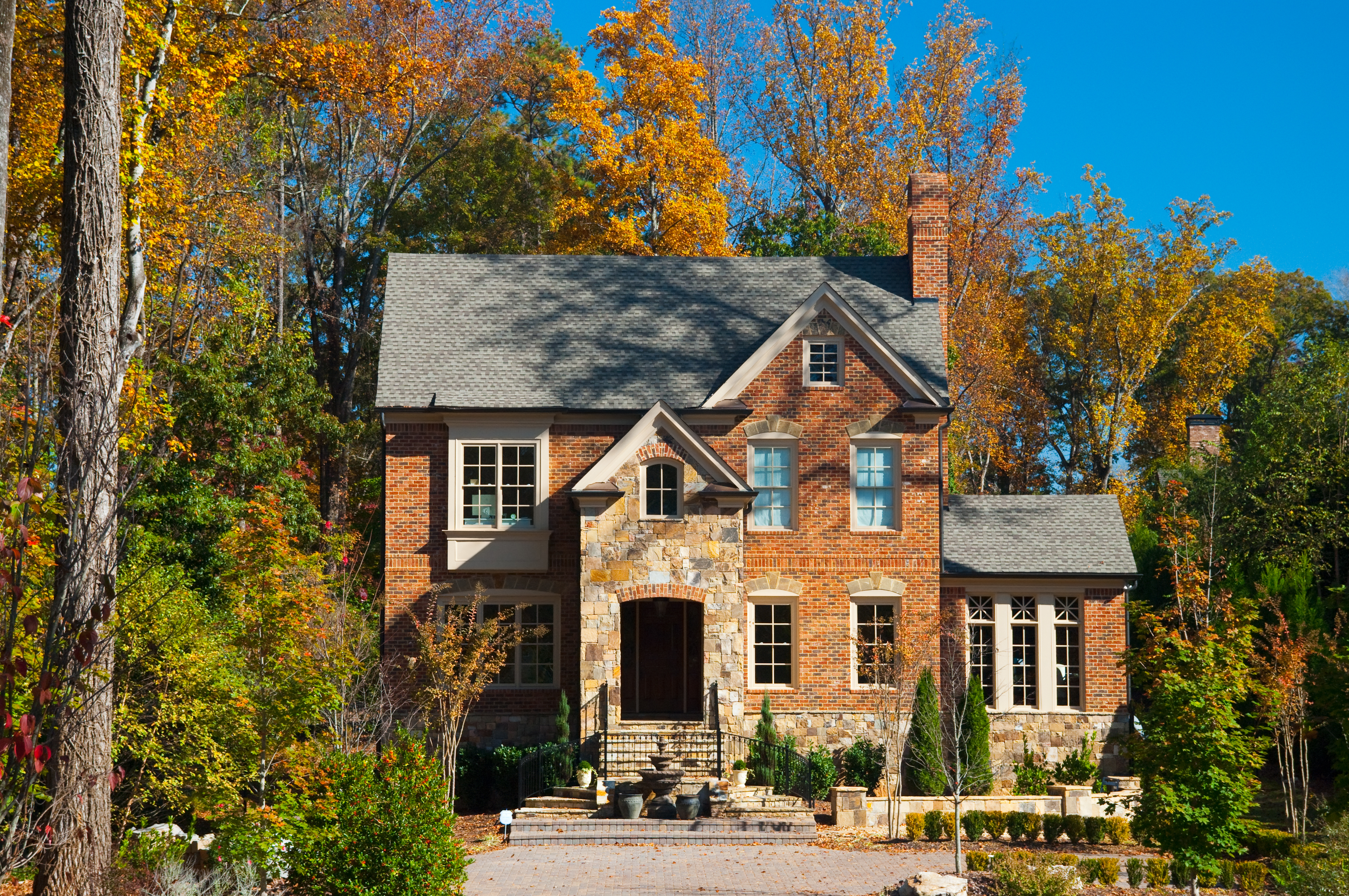
Fiber cement siding is popular among homeowners thanks to its durability. Learn more about fiber cement siding installation costs in Atlanta, GA.
Give your brick proper TLC


Minor hairline cracks or damage to mortar can be easily repaired.
Larger cracks, spalling, or signs of water damage indicate a deeper issue.
Watch for bowing walls—this could be caused by a tree root or structural issue.
Brick is an ancient building material, often lasting hundreds of years—so long as it's been given the proper maintenance and TLC. Knowing when it’s appropriate to repair or replace your home’s brick will help preserve your home’s structure for dozens of years, and keep your brick looking fresh, clean, and not a day over 80.
Brick is a remarkably resilient building material, and can last 80–100 years or even longer. That said, like anything else, it can be damaged beyond repair and might need to be replaced—here’s how to know when to repair your brick instead of replacing it.
| Repair | Replace |
|---|---|
| The mortar is damaged, not the brick | Severe cracking |
| Damage is surface level, such as a small chip | Structural damage (bowing or sagging walls) |
| If there is slight damage from a storm or animal | Significant efflorescence |
| Evidence of spalling |
Brick is one of the longest-lasting building materials; it has been around for centuries. The average life span for brick is between 80 and 100 years, but it often lasts much longer, especially with regular brick maintenance and care.
To keep your brick home in tip-top shape, have the masonry inspected annually—make sure to check for water damage, any crumbling or cracking, signs of mildew or mold, spalling, and plant growth.
Every year, you should also have your brick gently cleaned with mild detergent and water. During the cleaning, you should also unclog any weep holes; these are holes that are placed throughout a masonry structure to help the water drain away from the brick and increase airflow.
Finally, every 20 or 30 years, repoint the mortar on your brick home. This will not only help your brick stay sound, but it will keep it looking fresh for bonus curb appeal.
The cost to make minor repairs to brick can range from $500 to $1,000, depending on how many bricks need to be repaired and the extent of the damage—this is the ballpark cost for repairing cracks or tuckpointing.
To replace bricks, which is necessary if your existing bricks are spalling, you should expect to spend between $900 to $1,200 on average, if there are only a few sections to replace. For large sections of a wall, the cost can be as high as $20,000.
If you have large cracks and see signs of structural damage, such as bowing or sagging, there is likely a major underlying issue that needs to be addressed in addition to the brick replacement. Some of these repairs could include:
Tree root removal: A tree’s roots could be pushing into your home’s foundation
Soil pressure: Clogged gutters could lead to a buildup of soil pressure
Foundation problems: Homes with water damage, sinkholes, or uneven settling could have bowing or sagging walls, or develop extreme cracks
The work to fix these underlying problems could cost anywhere from $400 to $20,000 or more, but signs of structural damage should never be ignored—they can quickly balloon and become even more costly (and dangerous).
Very minor damage can be repaired on bricks or on its surrounding mortar; if you aren’t familiar with masonry work, it’s always best to hire a local masonry professional to complete the repair. These tasks are complicated and if you aren’t knowledgeable about this kind of work, you could cause more damage than existed in the first place.
While bricks can last 100 years or longer, mortar has a life span of about 20 to 30 years, so it often needs to be replaced or repaired more often. If you’ve noticed some mortar on your home starting to develop small cracks or chips, you can patch the mortar to give it new strength and better support its surrounding bricks.
Whether you know the source of the damage—a wild animal, a hailstorm, or something else entirely—or not, as long as the crack or chip in the brick is very superficial and there are no other signs of structural damage, you can have the brick patched up rather than replacing it.

Bricks are strong but susceptible to damage, particularly from water. It’s important to watch for water damage and replace any affected bricks promptly.
Medium cracks (⅛ to ¼-inch wide) and large cracks (over ¼-inch) should both be examined by a nearby masonry expert. While you should have these bricks replaced to ensure the other bricks are supported, the professional will also need to check for structural problems, water damage, or other underlying factors.
Water damage, poor construction, age, or lack of maintenance can cause brickwork to bow; you should first diagnose the cause of the problem and make sure to have that addressed, then complete any necessary restoration work on your brick.
A little bit of efflorescence—a white staining caused by salt deposits—is usually nothing to worry about, and easily removed with a pressure washer or diluted vinegar. If it starts to appear in large blotches on your brick, however, this could be an indication of underlying water damage and necessitate brick replacement (as well as water damage restoration work).
Spalling refers to the surface or top layer of a brick breaking down and falling off. When this happens, the softer interior of the brick is exposed to the elements and much less structurally sound. Spalling brick needs to be replaced.
From average costs to expert advice, get all the answers you need to get your job done.

Fiber cement siding is popular among homeowners thanks to its durability. Learn more about fiber cement siding installation costs in Atlanta, GA.

New siding in Atlanta can boost a home's curb appeal and protect against mold and moisture damage. Learn about the average siding replacement cost in Atlanta.

New vinyl siding adds aesthetic value and protection against water intrusion. Learn about the average vinyl siding installation cost in Atlanta.

Discover the pros, cons, and everything else you need to know about insulated vinyl siding.

Clapboard siding is classic, reliable, and hardy, but these wooden boards can get damaged in poor conditions. Here’s how to do a DIY repair for clapboard siding.

While Dutch lap is a more detailed type of siding, clapboard is often less expensive and more widely used. If you're weighing these options against each other, our guide can help you decide which type makes the most sense for your home’s facade.